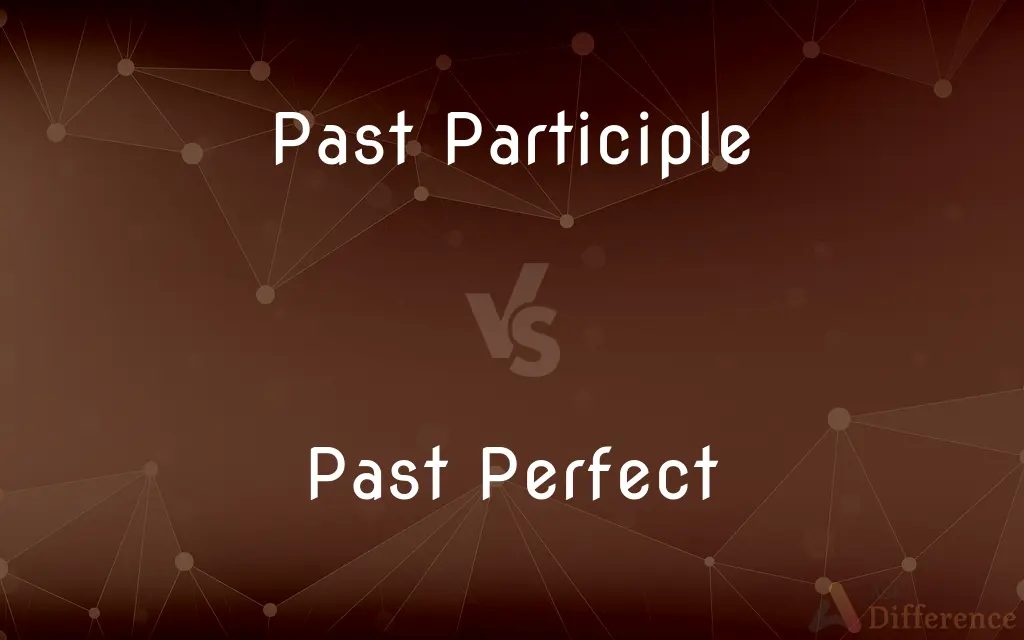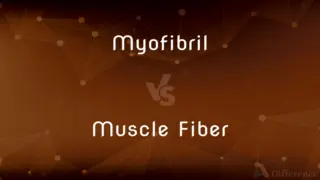Past Participle vs. Past Perfect — What's the Difference?
By Tayyaba Rehman — Published on December 30, 2023
Past Participle is a verb form (e.g., "eaten"), while Past Perfect is a tense indicating an action completed before another past action (e.g., "had eaten").

Difference Between Past Participle and Past Perfect
Table of Contents
ADVERTISEMENT
Key Differences
Past Participle is one of the non-finite verb forms in English and is commonly used to form perfect tenses and passive voice. In contrast, Past Perfect is a specific verb tense that uses the auxiliary verb "had" followed by the past participle form of the main verb.
When studying English grammar, Past Participle is often recognized as the third form of regular verbs (e.g., "go," "went," "gone"). On the other hand, Past Perfect is used to denote actions that happened before other actions in the past (e.g., "She had left before he arrived").
A unique characteristic of the Past Participle is its ability to function as an adjective in sentences (e.g., "The broken vase"). In contrast, Past Perfect exclusively serves as a verb tense and can't double as an adjective.
In compound verb structures, the Past Participle is vital. For instance, passive forms ("The book was written") and perfect tenses ("I have written") use it. Meanwhile, Past Perfect is exclusive to indicating the "past of the past," providing a time reference in narratives.
Understanding both Past Participle and Past Perfect is crucial for mastering English verb forms and tenses. While the past participle represents a verb's form, the past perfect captures a specific temporal relationship between past actions.
ADVERTISEMENT
Comparison Chart
Definition
A non-finite verb form
A verb tense
Usage
Perfect tenses, passive voice, adjectives
Indicates an action completed before another action
Formation for Regular Verbs
Base verb + -ed (e.g., "talked")
Had + Past Participle (e.g., "had talked")
Role in Sentence
Can be a verb or an adjective
Always a verb
Example
"A written exam"
"She had written the exam."
Compare with Definitions
Past Participle
The third principal form of a verb.
She has eaten her lunch.
Past Perfect
A verb tense indicating an action completed before another past action.
She had left before he arrived.
Past Participle
Can function as an adjective.
The lost cat returned home.
Past Perfect
Describes unreal past situations.
If you had listened to me, this wouldn't have happened.
Past Participle
Represents a completed action or state.
The chosen candidate gave a speech.
Past Perfect
Uses "had" followed by the past participle of the verb.
I had finished my work by noon.
Past Participle
Used with auxiliary verbs to form perfect tenses.
They have visited the museum.
Past Perfect
Expresses a prior event in narratives.
By the time we got there, the store had closed.
Past Participle
A verb form for passive voice.
The letter was sent yesterday.
Past Perfect
Used for emphasis on the order of past actions.
They had already seen the movie when we invited them.
Common Curiosities
How is the Past Participle of regular verbs formed?
For regular verbs, the Past Participle is formed by adding -ed to the base verb.
In what situations is Past Perfect used?
Past Perfect indicates an action that was completed before another past action or point in time.
What is a Past Participle?
A Past Participle is the third form of a verb used in perfect tenses and passive voice.
Can Past Participle be used as an adjective?
Yes, the Past Participle can function as an adjective (e.g., "a broken toy").
How does Past Participle differ from Simple Past?
Past Participle is a verb form, while Simple Past denotes a past action without auxiliary verbs.
How is Past Perfect formed?
Past Perfect is formed using "had" followed by the past participle of the main verb.
Are there irregular Past Participles?
Yes, many verbs have irregular past participles (e.g., "go" becomes "gone").
Can Past Perfect denote regret?
Yes, it can express regret for something not done in the past (e.g., "I wish I had studied more").
Can you give an example of Past Perfect in a conditional sentence?
Sure, "If she had known, she would have come."
Does Past Perfect always need another past event for reference?
Often, but context can sometimes make the reference clear without stating the other event.
Is Past Participle always used with an auxiliary verb?
Often, but not always. It can also be used as an adjective or in passive constructions without perfect tenses.
Can Past Perfect be used without specifying the other past event?
While it's clearer with the reference, context can sometimes allow for its omission.
Is it essential to master both Past Participle and Past Perfect in English?
Yes, they are fundamental concepts in understanding verb forms and tenses.
In the sentence "I had seen the movie," which is the Past Participle?
In that sentence, "seen" is the Past Participle.
Is Past Participle always the same as the passive voice form?
Yes, the passive voice uses the past participle form of the verb, but with an auxiliary verb.
Share Your Discovery

Previous Comparison
Rugby League vs. Rugby Union
Next Comparison
Myofibril vs. Muscle FiberAuthor Spotlight
Written by
Tayyaba RehmanTayyaba Rehman is a distinguished writer, currently serving as a primary contributor to askdifference.com. As a researcher in semantics and etymology, Tayyaba's passion for the complexity of languages and their distinctions has found a perfect home on the platform. Tayyaba delves into the intricacies of language, distinguishing between commonly confused words and phrases, thereby providing clarity for readers worldwide.











































